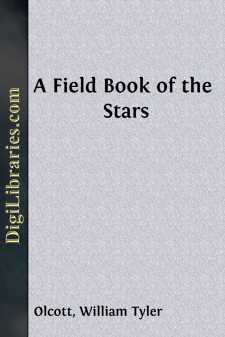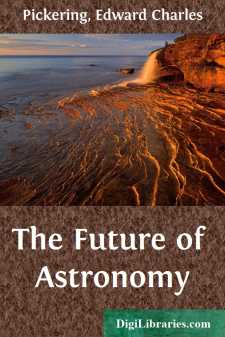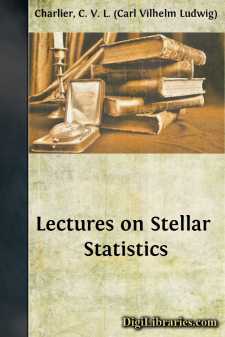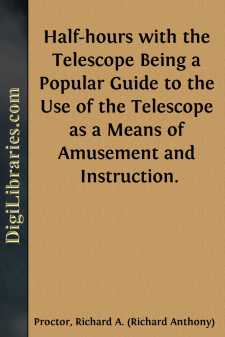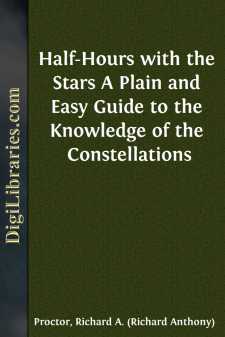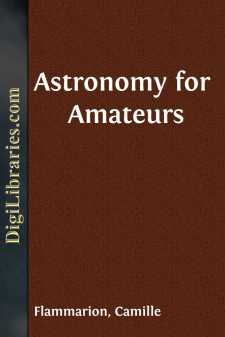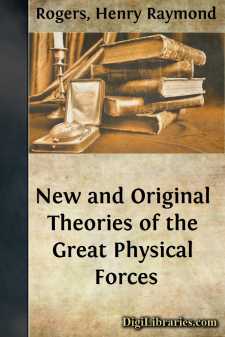Science
- Astronomy
- Biology 40
- Chemistry 13
- Electricity 1
- General 38
- History 6
- Light 1
- Paleontology 2
- Philosophy & Social Aspects 1
- Physics 3
- Relativity 2
- Study & Teaching 1
- Waves & Wave Mechanics 1
Astronomy Books
Sort by:
THE DIAGRAMS. The diagrams, it will be observed, are grouped under the seasons, and they indicate the positions of the constellations as they appear at 9 o'clock p.m. in mid-season. To facilitate finding and observing the constellations, the student should face in the direction indicated in the text. This applies to all constellations excepting those near the zenith. The four large plates are so...
more...
THE FUTURE OF ASTRONOMY BY PROFESSOR EDWARD C. PICKERING HARVARD COLLEGE OBSERVATORY It is claimed by astronomers that their science is not only the oldest, but that it is the most highly developed of the sciences. Indeed it should be so, since no other science has ever received such support from royalty, from the state and from the private individual. However this may be, there is no doubt that in...
more...
CHAPTER I. APPARENT ATTRIBUTES OF THE STARS. 1. Our knowledge of the stars is based on their apparent attributes, obtained from the astronomical observations. The object of astronomy is to deduce herefrom the real or absolute attributes of the stars, which are their position in space, their movement, and their physical nature. The apparent attributes of the stars are studied by the aid of their...
more...
CHAPTER I. EARLY OBSERVERS OF MARS. Few persons except astronomers fully realise that of all the planets of the Solar system the only one whose solid surface has been seen with certainty is Mars; and, very fortunately, that is also the only one which is sufficiently near to us for the physical features of the surface to be determined with any accuracy, even if we could see it in the other planets. Of...
more...
CHAPTER I. A HALF-HOUR ON THE STRUCTURE OF THE TELESCOPE. There are few instruments which yield more pleasure and instruction than the Telescope. Even a small telescope—only an inch and a half or two inches, perhaps, in aperture—will serve to supply profitable amusement to those who know how to apply its powers. I have often seen with pleasure the surprise with which the performance even of an...
more...
It is very easy to gain a knowledge of the stars, if the learner sets to work in the proper manner. But he commonly meets with a difficulty at the outset of his task. He provides himself with a set of the ordinary star-maps, and then finds himself at a loss how to make use of them. Such maps tell him nothing of the position of the constellations on the sky. If he happen to recognize a constellation,...
more...
INTRODUCTION The Science of Astronomy is sublime and beautiful. Noble, elevating, consoling, divine, it gives us wings, and bears us through Infinitude. In these ethereal regions all is pure, luminous, and splendid. Dreams of the Ideal, even of the Inaccessible, weave their subtle spells upon us. The imagination soars aloft, and aspires to the sources of Eternal Beauty. What greater delight can be...
more...
CHAPTER I. INTRODUCTORY. The Sun. The sun's position in the great field of energy is daily becoming more exalted in the estimation of philosophic minds. His labors are being revealed to us with a distinctness never before conceived. He it is that stored the coal in the bosom of the earth, and piled up the polar ice. He it is that aids the chemist, drives the engine, ripens the harvest, dispenses...
more...


